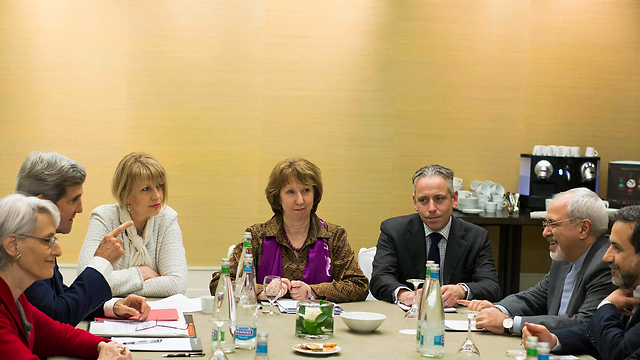
Major powers and Iran are getting close to a first-stage agreement to curb Iran's nuclear program and it is "quite possible" a deal could be reached when they meet Nov. 21-22 in Geneva, a senior US official told reporters.
"I don't know if we will reach an agreement. I think it is quite possible that we can, but there are still tough issues to negotiate," said the official.
Related stories:
- Netanyahu 'unimpressed' by IAEA nuclear report on Iran
- US proposes 6-month freeze for Iran's nuclear program
- Iran: World must recognize our 'nuclear rights'
According to him, EU foreign policy chief Catherine Ashton and Iranian Foreign Minister Javad Zarif were to meet on Nov. 20 in Geneva and a wider group - including Britain, China, France, Germany, Russia and the United States - would meet Iranian officials there on the following two days.
Zarif faces off with Ashton in last week's talks (Photo: Reuters)
Earlier on Friday, Zarif said he is hopeful ahead of next week's negotiations with world powers and reiterated Tehran's demand for recognition of what it calls its "nuclear rights."
There is no chance for the upcoming round of talks to succeed if the West ignores Iran's demand for formal recognition of its right to enrich uranium, Zarif said in comments carried by the semi-official Fars news agency.
Zarif's statements were made against the background of a new report by the International Atomic Energy Agency according to which Iran has frozen its uranium enriching activities.
The IAEA said that, in the past three months, only four new centrifuges had been installed at Iran's Natanz plant, compared with 1,861 in the previous period.
Meanwhile US President Barack Obama sought to reassure skeptical US lawmakers on Thursday that any easing of sanctions on Iran that emerges from negotiations could easily be reversed and "ramped back up" if Tehran fails to curb its nuclear program.
"If we're serious about pursuing diplomacy, then there's no need for us to add new sanctions on top of the sanctions that are already very effective, and that brought them (the Iranians) to the table in the first place," Obama told a White House news conference.
"Now, if it turns out they can't deliver, they can't come to the table in a serious way and get this issue resolved, the sanctions can be ramped back up," he said.
- Receive Ynetnews updates
directly to your desktop
















